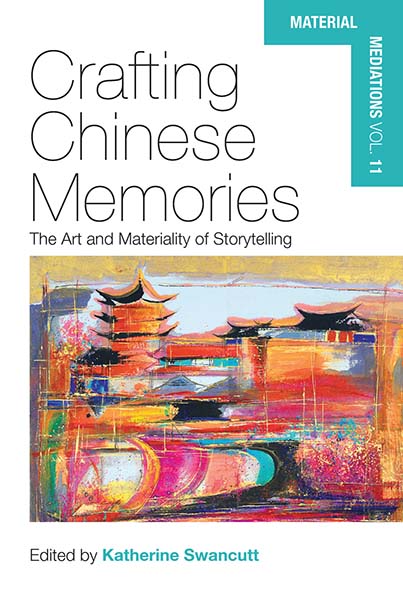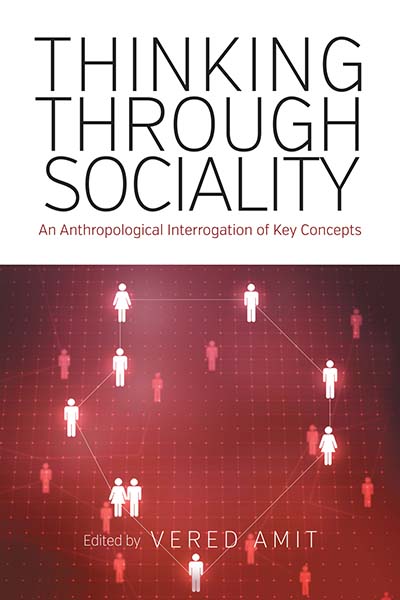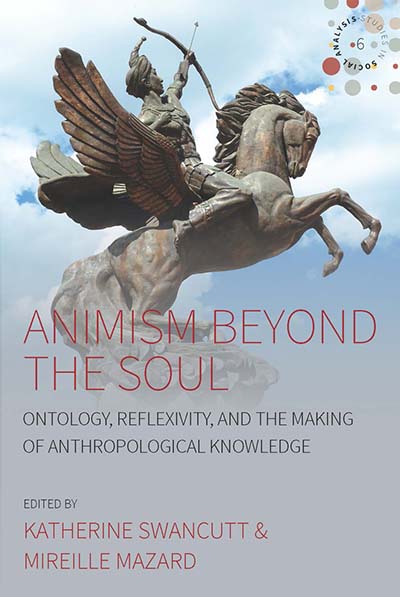Tag: Editor article
Capacity Building in Ethnographic Comparison
by Rachel Douglas-Jones and Justin Shaffner, editors of Hope and Insufficiency: Capacity Building in Ethnographic Comparison
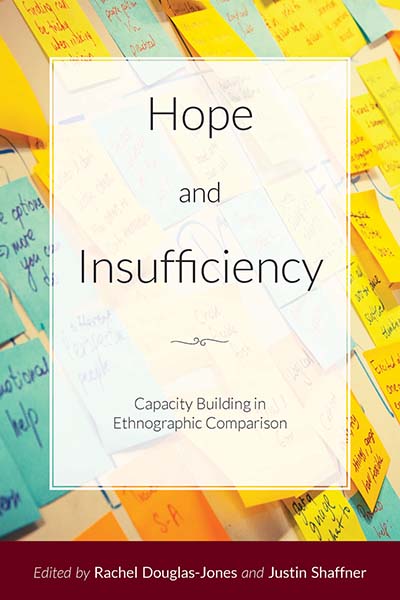
We open our new edited collection Hope and Insufficiency by traveling the world in workshops. Three capacity building events, ranging from Paramaribo to Addis Ababa, sketched as thumbnails, form our introductory paragraph. These three events, drawn from thousands, simply demonstrate the breadth of topics to which it is applied. Capacity building, or its more recent iteration as capacity development, is, we argue, both ubiquitous and under-theorised within the social sciences. The title of our book identifies characteristics of capacity building’s intervention: as we put it, hope and insufficiency interplay in a way that makes the idea of capacity building persuasive.
Continue reading “Capacity Building in Ethnographic Comparison”Crafting Chinese Memories: The Art and Materiality of Storytelling
by Katherine Swancutt
Katherine Swancutt is the author of Crafting Chinese Memories: The Art and Materiality of Storytelling.
Storytelling is always an entertaining and lively theme, but it’s surprisingly elusive to come to grips with conceptually. This is especially the case when pairing storytelling with other great warhorses of social theory like art, materiality, and memory, which often require fine-grained interdisciplinary detail to bring them fully to light. Factor in the study of China from ancient times to the present day – with an expansive focus that includes not only the Han ethnic majority, but also China’s ethnic minorities, the strange, and the Other – and you have the makings of a rather epic volume on one of the oldest and richest civilizations in the world. Crafting Chinese Memories sets out to do all of this through original essays on Chinese art, film, historiography, literature, socialism, imagination, fantasy, race, colonialism, statelessness, personal memoirs, elite inner circles, legends, ethnography, mimesis, and gestures to what counts as ‘memorable’. Wearing multiple disciplinary hats at once, each of the volume’s contributors explores personal, social, and cultural memories in and of China. Their contributions reveal the myriad mise-en-abyme (or ‘stories within a story’) that unfold through the memory works of artists, filmmakers, novelists, life writers, civil servants, and indigenous storytellers. Readers are invited to treat themselves to this enthralling panorama of memory-making that unfolds within and beyond China’s borders.
Continue reading “Crafting Chinese Memories: The Art and Materiality of Storytelling”Delta Life: Exploring Dynamic Environments where Rivers Meet the Sea
Edited by Franz Krause and Mark Harris
Franz Krause and Mark Harris are the editors of Delta Life: Exploring Dynamic Environments where Rivers Meet the Sea (Open Access).

What is a river delta? There is a popular answer to this question among people who have had geography lessons and seen satellite images of deltas: usually, a delta is the area formed by the sediments of a river as it spills into another waterbody. It often features a fascinating network of meandering channels and distributaries, and its human land uses must adapt to the vagaries of a dynamic terrain characterized by land subsistence, flood risk, rampant erosion and high sediment loads.
Do Petitions matter? Rethinking Jewish Petitioning during the Holocaust
Thomas Pegelow Kaplan and Wolf Gruner
Raul Hilberg’s path-breaking 1961 study The Destruction of the European Jews rightfully remains on the reading list of any serious student of the Holocaust. Nonetheless, Hilberg’s insistence on European Jews‘ alleged “almost complete lack of resistance” has been subjected to frequent scholarly criticism. He partially based this claim on a cursory reading of petitions: “Everywhere, the Jews pitted words against rifles” and “everywhere they lost.”
Continue reading “Do Petitions matter? Rethinking Jewish Petitioning during the Holocaust”INTRODUCING MICHAEL R.M. WARD AS THE NEW EDITOR OF BOYHOOD STUDIES
 It is with real pleasure, but also with a little apprehension, that I introduce myself as the new editor of Boyhood Studies: An Interdisciplinary Journal. It is a very important and critical time for gender scholars, and I want to use this piece as a general announcement of this change in, or addition to, in editorship and the future direction, I would like to take the journal in.
It is with real pleasure, but also with a little apprehension, that I introduce myself as the new editor of Boyhood Studies: An Interdisciplinary Journal. It is a very important and critical time for gender scholars, and I want to use this piece as a general announcement of this change in, or addition to, in editorship and the future direction, I would like to take the journal in.
Over the past few months, I have been in conversation with current editor Diederik Janssen and the publishers about becoming more involved in the journal in an editorial capacity. I have sat on the editorial board for a number of years and I am pleased to announce that from the next volume, my role will become one of editor.
As one of the founding editors, Diederik Janssen has been involved in the journal since its inception in 2007. In 2015 he oversaw a move for the journal between publishers (The Men’s Studies Press to Berghahn Books) and a name change (Thymos to its current title). Diederik has recently embarked on the onerous task of completing a doctorate and with all the hurdles and extra work this brings, it seemed an ideal time to come onboard as an extra pair of hands to share the load and to help the journal grow in readership and submissions. Diederik will continue in a new role as managing editor. Continue reading “INTRODUCING MICHAEL R.M. WARD AS THE NEW EDITOR OF BOYHOOD STUDIES”
To Embroider the Voice with its Own Needle
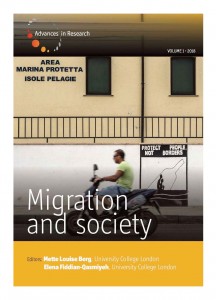 Yousif M. Qasmiyeh
Yousif M. Qasmiyeh
Creative Encounters Editor, Migration and Society
In poetry we hunt down details in the hope of preserving them and, in so doing, we assert our commitment to re-reading the daily and re-inventing the becoming.
In Creative Encounters, our modest aim, in this inaugural edition of Migration and Society, is to embroider the voice with its own needle: an act proposed to problematise the notion of the voice; something that cannot be given (to anyone) since it must firmly belong to everyone from the beginning. In voice, we look for our own meaning in this narrow-vast world. We look for something to cling to for the sake of passing time – something that reminds us of our presence as scattered voices.
In Mohamed Assaf’s poems, published in this edition of Creative Encounters, nothing seems young save the poet or more precisely his real age. In his observations, memories are as conspicuous as the sky on a clear day and as precise as an archivist’s. He writes what takes him back to his place: Syria, but also what he sees in the vicinity of his body – the body which has had to endure multiple flights in multiple times. Not with our approval but in spite of it, Mohamed writes the archive of what it means to live a life whose meaning is reduced to one’s own survival – a bodily survival – in the midst of such formidable physical and aesthetic destruction.
Mohamed’s name as printed in English M-o-h-a-m-e-d is not the name which was conferred upon him by the woman who gave birth to him in the place of his Arabic language. Rather, it is the transliterated twin of his name. It may be considered an equivalence or another proper noun which marks a change that will always be carried in the name, that is: the pronunciation of the new. Or, more pertinently, a trace of his definite name which is, as his poetry, still travelling in all directions.
Five poems were written by Mohamed Assaf – a young Syrian boy who currently lives in Oxford with his family and studies at Oxford Spires Academy – under the mentorship of the poet Kate Clanchy. View the Poems.
*Five Poems by Mohamed Assaf will be available to access until 1/31/2019.
To access the entire inaugural issue of Migration and Society until 1/31/2019, please use code: MS2019. To redeem, please visit: www.berghahnjournals.com/redeem.
Thinking through Sociality: An Anthropological Interrogation of Key Concepts
This is a guest post written by Vered Amit, who edited the volume Thinking Through Sociality: An Anthropological Interrogation of Key Concepts (now available in paperback!). Read the Introduction online for free.
Continue reading “Thinking through Sociality: An Anthropological Interrogation of Key Concepts”
Anthropological Knowledge Making, the Reflexive Feedback Loop, and Conceptualizations of the Soul
The following is a guest post from Katherine Swancutt, who co-edited Animism beyond the Soul: Ontology, Reflexivity, and the Making of Anthropological Knowledge. This title is now available in hardback and paperback, and we’re offering 25% off this book with code SWA663 until June 30, 2018.
Celebrating 10 Years of Girlhood Studies

